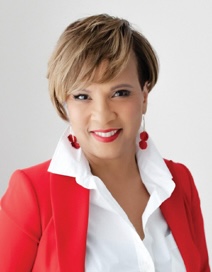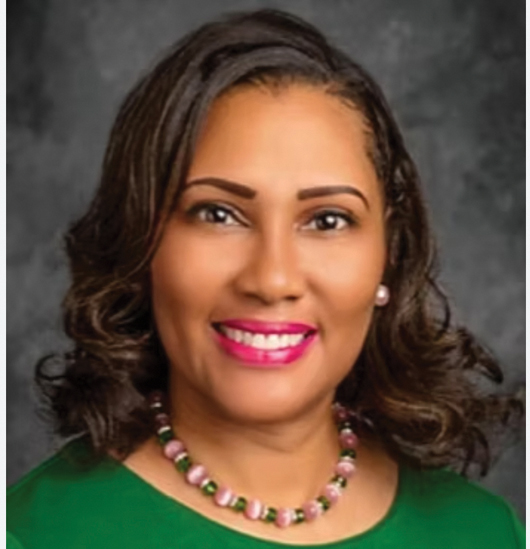Winsome Earle-Sears’ candidacy a missed opportunity by Sophia A. Nelson and Colita Nichols Fairfax
11/6/2025, 6 p.m.

When Winsome Earle-Sears — who lost to Democrat Abigail Spanberger by nearly 15 points Tuesday — became the first Black woman nominated for governor of Virginia by a major political party, history took note. Her image — poised, confident, gun in hand — was hailed by some as proof that the Republican Party was evolving.
But for many in Virginia’s Black community, the moment landed not with applause, but with solemn reflection. Because in our history, “firsts” have never been about optics. They have been about legacy, sacrifice and duty.
For Black Americans, a “first” carries sacred weight. It represents generations who were denied the vote, the job, the education, the opportunity.
Our firsts have always stood on the shoulders of those who came before — rooted in church life, raised through civic sisterhoods like The Links or the National Council of Negro Women, or one of the Divine Nine Greek-letter organizations steeped in the ethos of collective uplift. They did not ascend alone. They rose carrying their people with them.
Earle-Sears did not come from that lineage, nor did her campaign reflect it. Her politics were shaped not by the moral traditions of the Black community, but by a movement increasingly defined by grievance and exclusion. She often spoke as if detached from the struggle that made her rise possible. She chose the posture of independence over interdependence, the symbolism of being “the first” over the responsibility that comes with it.
Representation matters. But representation without empathy or accountability becomes performance. Earle-Sears’ campaign leaned heavily on the imagery of her identity — a Jamaican immigrant, a Marine, a barrier-breaker — while offering little policy substance for those whose votes and futures she sought to represent. She did not address the racial wealth gap, health disparities, sentencing bias, or the inequities in housing and education that shape Black life in this commonwealth.
Where was the agenda for working-class Virginians? For Black entrepreneurs seeking access to capital? For families trapped by high rents and low wages? For the preservation of Black cemeteries and museums that anchor our heritage? These were not her priorities. Instead, she wielded her immigrant identity as a way to separate herself from the very people who paved the road she walked. She played identity politics in reverse; she used her background and presence as a Black woman not to unite, but to distance.
That choice cut deep. Because a true first never forgets she is the product of her people’s prayers and persistence. A first who does not carry her community with her is not a bridge, she is an island.
Virginia knows the difference between symbolism and substance.
In 1951, a 16-year-old girl named Barbara Johns led a student strike in Farmville to protest the separate and unequal conditions of her segregated school. Her courage helped ignite the legal fight that culminated in Brown v. Board of Education. Next year, her statue will stand in the U.S. Capitol’s Statuary Hall, replacing one of a Confederate general. That is what a true first looks like: a young Black woman whose moral clarity and collective courage changed the course of a nation.
Johns’ story echoes the legacy of Shirley Chisholm, another daughter of Jamaica, who became the first Black woman elected to Congress in 1968, representing New York. Chisholm’s motto — “Unbought and unbossed” — was not about personal defiance. It was about fearless advocacy for the people of Bedford-Stuyvesant, for women, for workers, for the voiceless. She, like Johns, understood that being first was never about her; it was about those who would come next.
And lest we forget the first woman vice president of the United States of America, Kamala Harris, a mixed race Black woman of South Asian and Jamaican heritage. (In full disclosure, she is also our sorority sister.) Harris’ background, career and candidacy represent the legacy of service over self and collective over individual that defines a true “first” for our community.
Historically, Black women who reached high office have done so with that same sense of stewardship. When Mary McLeod Bethune founded a college, when Barbara Jordan entered Congress, when Harris took the oath as vice president, they knew the world was watching not only what they achieved, but who they served. “When and where I enter,” wrote pioneering Black educator Anna Julia Cooper, “the race enters with me.”
That is the sacred charge of a first, to walk through the door in such a way that others may follow. To expand the circle of belonging, not narrow it.
The tragedy of Earle-Sears’ campaign was not simply that she lost, but that she squandered a rare opportunity. A Black woman atop a statewide ticket in Virginia could have been a profound moment of unity. She could have spoken to the pain and promise of our shared past, embodying the bridge between history and hope.
Instead, she chose combat over compassion, condescension over connection, and silence where solidarity was needed most. She mistook proximity to power for progress. And in doing so, she reminded us that not every “first” is a victory. Some are a warning.
As Black women, scholars and Virginians, we do not write this to chastise, but to clarify.
Earle-Sears’ candidacy was a missed opportunity for reconciliation, a moment when symbolism could have become substance. The next “first” must do more than wear our skin. She must carry our story. She must be grounded in the moral soil of our shared struggle, speak to the needs of the least of these, and remember that freedom is never individual; it is always collective.
That is the meaning — and the duty — of a true first.
 Sophia A. Nelson
Sophia A. Nelson
Sophia A. Nelson is founder & CEO of the Redefining Freedom Center of Virginia and a former U.S. House Republican Congressional Committee counsel.
 Colita Nichols Fairfax
Colita Nichols Fairfax
Colita Nichols Fairfax is professor in the Center for African American Public Policy at Norfolk State University.
This commentary originally appeared on VirginiaMercury.com.






